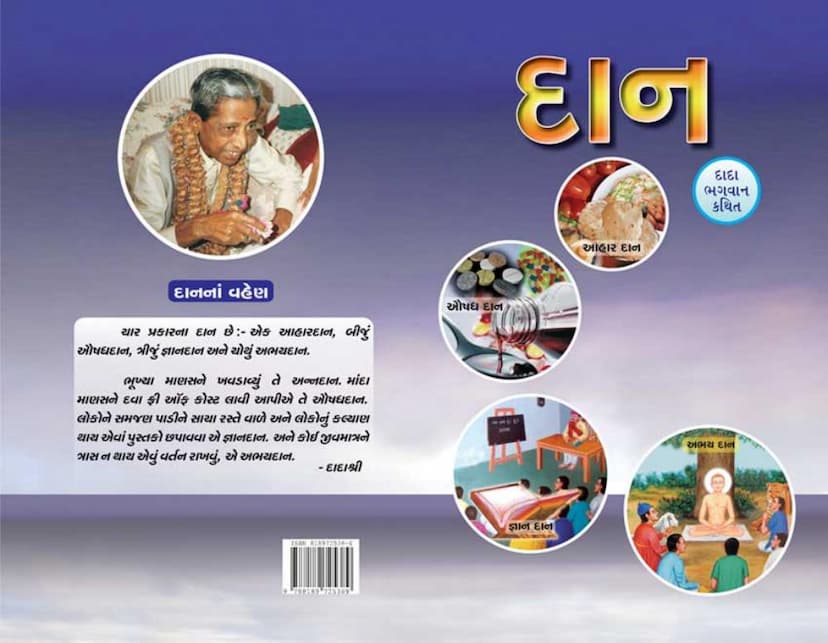Daan
Added to library: September 1, 2025

Summary
Here's a comprehensive summary of the Jain text "Daan" by Dada Bhagwan, based on the provided pages:
Book Title: Daan (Charity/Giving) Author: Dada Bhagwan (referred to as Dada Shri) Publisher: Dada Bhagwan Foundation
Core Theme: The book elaborates on the concept of Daan (charity/giving) from a spiritual and practical perspective, emphasizing the importance of awareness, intent, and the right way of giving to achieve spiritual progress and well-being.
Key Concepts and Teachings:
-
Four Types of Daan: Dada Bhagwan categorizes Daan into four fundamental types:
- Aahar Daan (Food Charity): Giving food to the hungry.
- Aushadh Daan (Medicine Charity): Providing medicine free of cost to the sick.
- Gyan Daan (Knowledge Charity): Publishing books and spreading knowledge that guides people to the right path and benefits society.
- Abhay Daan (Fearlessness Charity): Behaving in a way that causes no harm or distress to any living being.
-
Purpose of Daan:
- Daan is a way to give happiness to others and, in turn, receive happiness oneself.
- It's not primarily for liberation (moksha) but for experiencing inner happiness.
- Giving brings inner contentment and helps one distinguish between right and wrong actions.
- Even small acts of giving, like feeding animals, can bring immense joy.
-
Daan and Spiritual Growth:
- Daan is presented as a path to earning merit and enhancing spiritual progress.
- While fasting increases inner awareness, Daan is likened to sowing seeds in a field, which will yield fruits.
- The true value of Daan lies in the intent and awareness with which it is given. Unaware giving can lead to a "loss" even when giving.
-
The Role of Wealth (Lakshmi):
- Wealth accumulated after 1942 is considered "sinful wealth" and doesn't last.
- Wealth should be channeled towards righteous paths (dharma).
- Accumulating wealth can bring troubles, worries, and ego; therefore, it's better to use it for good.
- Wealth spent for the welfare of others is considered true "currency" or "balance" for the next life.
-
Where to Give Daan:
- Give to religious institutions where wealth is used for good purposes. Avoid places where it might be misused.
- Prioritize Gyan Daan: Those with more wealth should focus on knowledge charity (publishing books, spreading wisdom).
- Abhay Daan is Supreme: This is the highest form of Daan and doesn't require money. It involves maintaining such behavior that no living being is even slightly disturbed.
- Financial Giving: If one has wealth, it should be used for good causes. However, direct cash giving can be problematic in this age due to misuse. It's better to provide food or essentials directly.
-
Challenges and Misconceptions in Giving:
- Ego and Fame: Many give Daan for name and fame, which negates its true spiritual benefit. Plaques and public recognition are considered a way of "selling" one's name.
- Misuse of Donations: Money given to the needy can be misused or sold by them, leading to wastage. Giving in cash is discouraged for this reason.
- "Soi Daan" (Needle Charity): Giving small amounts after engaging in illegal activities (like black marketing) to maintain a good reputation is seen as "needle charity" and doesn't truly alleviate past sins.
- Compelled Giving: Giving due to pressure or obligation does not yield the same results as voluntary giving.
- Hidden Intentions: If the giving is motivated by a desire for fame or to hide something, its spiritual benefit is lost or diminished.
-
The Ideal Way to Give:
- Awareness and Intent: True Daan is given with awareness and pure intention, not for recognition.
- Discreet Giving: Giving secretly is highly valued as it avoids ego and the desire for praise.
- Prioritize True Welfare: Give where it leads to true welfare and spiritual upliftment.
- Give to the Worthy: Giving to those who are genuinely in need and who will use it constructively is important.
- Provide Sustenance, Not Just Cash: Instead of giving cash that might be misused, providing food, medicine, or support for a livelihood is often better.
- Giving to Mahatmas: Dada Bhagwan emphasizes that giving to His Mahatmas (followers) is a highly beneficial form of Daan, as they are pure in their intent and do not seek personal gain. Feeding them is considered a great ritual.
- Giving to Simandhar Swami: Giving in the land of Lord Simandhar Swami is also highlighted as a supremely beneficial act.
-
Understanding "Surplus" and Stewardship:
- Surplus Wealth: Wealth that is not needed for basic family needs and is truly in "surplus" should be used for good causes.
- Family Responsibilities: While giving to others is important, one must ensure the family's basic needs are met first, and they are not left in hardship.
- Trusteeship: Living as a trustee of wealth, rather than an owner, is an ideal way to manage it.
- Intent Matters: The intent behind the giving, whether for fame, compulsion, or true welfare, determines the outcome and the merit earned.
-
The True Donor:
- A true donor is one who gives generously and consistently, whose wealth doesn't diminish even when given abundantly (like the historical example of Seth Datatar).
- True giving is often guided by a pure, selfless intent and sometimes by the advice of a knowledgeable person (like a Gnani Purush).
Overall Message: The book stresses that Daan is not merely a transactional act of giving money. It is a practice that, when performed with the right intention, awareness, and understanding of its true purpose, contributes significantly to spiritual progress. The emphasis is on quality of intent and awareness over the mere quantity of the donation, with Abhay Daan and Gyan Daan being highlighted as the highest forms. The teachings encourage discerning giving, prioritizing those who will utilize it for genuine welfare and spiritual growth.